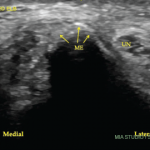In the short term, corticosteroid injections can help, but their risks for long-term use are well known. For severe cases, surgery has been found to resolve symptoms, either completely or almost completely, about three-quarters of the time.
Dr. Doughy added that weakness or atrophy is “an indication to act fast. Don’t wait on a referral to orthopedic or plastic hand surgery.”
The Inner Ear
Andrea Vambutas, MD, chair of otolaryngology at the Zucker School of Medicine at Northwell Health/Hofstra University, Hempstead, N.Y., addressed autoimmune inner ear disease (AIED). She noted the understanding of AIED has followed a pattern similar to other diseases.
“More and more, we’re seeing a number of different autoimmune diseases being reclassified as autoinflammatory diseases based on some of the characteristics we see. … There are a lot of paradigm shifts that we’re beginning to see,” said Dr. Vambutas.
Muckle-Wells syndrome is an example of an autoinflammatory disease that causes sensorineural hearing loss, among other clinical findings.
Evidence exists that AIED has features similar to autoimmune disease, including cochlin-specific Th17 cells and high titer, anti-cochlin antibodies. However, the general lack of autoantibodies, the low-titer autoantibodies and the dysregulation of interleukin (IL) 1 and TNF support an autoinflammatory phenotype. No clear biomarker exists for AIED. Laboratory testing is not of much value because no antibodies have been found to be robustly or uniquely positive across patients.
Although two studies found that systemically administered anti-tumor necrosis factor (TNF) medication did not benefit patients with AIED, locally administered anti-TNF medication given to patients with AIED who were steroid-dependent benefited patients in two small series.3,4 Also, N-acetylcysteine produced good results when combined with glucocorticoids in another study of sudden sensorineural hearing loss, Dr. Vambutas said.5
Dr. Vambutas and colleagues are conducting a phase 2 clinical trial examining the IL1-antagonist anakinra in patients with glucocorticoid-resistant AIED. The study will include three groups: one that will take anakinra followed by placebo, one that will take placebo followed by anakinra and one that will take only anakinra over 84 days.
According to Dr. Vambutas, outside clinical trials, about 40% of patients with AIED who are glucocorticoid-resistant had hearing improvement with anakinra, while about 73% of patients who are glucocorticoid-dependent did. Of the 28 patients who were glucocorticoid-resistant, only one of six patients with elevated C-reactive protein improved while taking anakinra.
Some patients who had been previously glucocorticoid-resistant, for whom IL-1 inhibition with anakinra failed, later responded to glucocorticoids, which is an interesting phenomenon, Dr. Vambutas noted.


